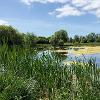Discover our ponds and lakes

There are over 500 ponds found in Basildon, ranging in different sizes, most of these are field ponds, tracing back to Basildon's farming past. Our local ponds and lakes play host to a flourishing array of ecosystems, providing a home to around two-thirds of all freshwater species like the common frog, newts, and dragonflies.
These water bodies are not only vital for the environment but also act as defenders against climate change, flooding, and pollution. Sadly, a number of these ponds are now at risk, leading to a decline in local wildlife. Such habitats provide a haven for an extensive range of plants and creatures, ranging from the tiniest algae to larger species like the Great Crested Newts (Triturus cristatus), which have a strong presence in the south-eastern parts of England.
Where are they found?
Ponds are found in gardens, towns and villages, countryside on farmland, floodplains, and heathlands, in woods, on grasslands and on moors.
Conservation
Many ponds have been drained or neglected and have filled with silt and vegetation or stagnated under fallen leaves. Some ponds become choked by alien invasive plants such as New Zealand pygmy weed, which is often unknowingly introduced by people emptying ponds or aquaria. Because they are small, ponds are particularly vulnerable to contamination by pollutants that run-off in rainwater from agricultural land and roads.
Recreational activities can also adversely affect ponds, such as allowing dogs to swim (which churns up the sediment) and feeding waterfowl (which can result in damagingly high populations and nutrient problems). Half a million ponds have been lost over the last 100 years and one in five remaining ponds are thought to be in poor condition. Initiatives are underway to try and restore lost ponds and create new ones that are not contaminated by alien plants or run-off.
To guarantee the safety of our local wildlife, please refrain from allowing dogs to enter our ponds. Let's protect and create clean ponds for freshwater wildlife. Together, we can ensure these mini paradises thrive for future generations and help make a difference to tackle climate change.
